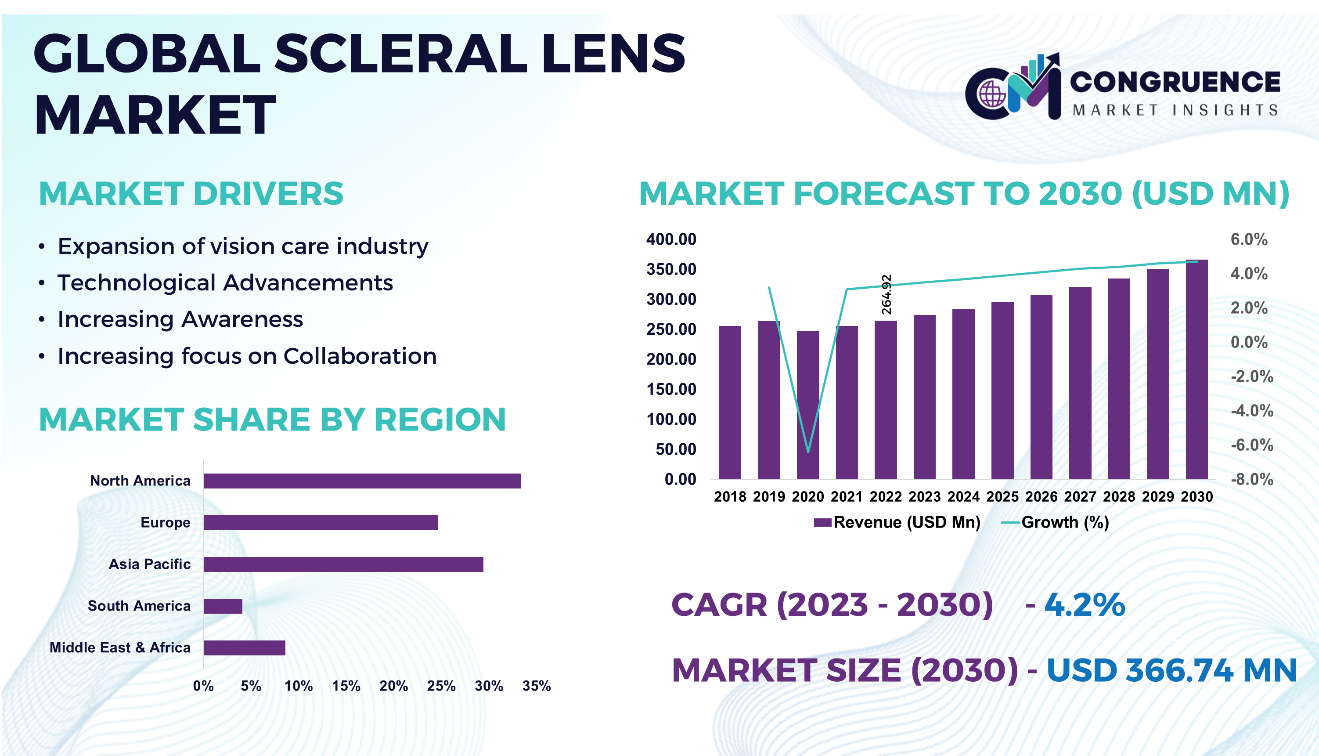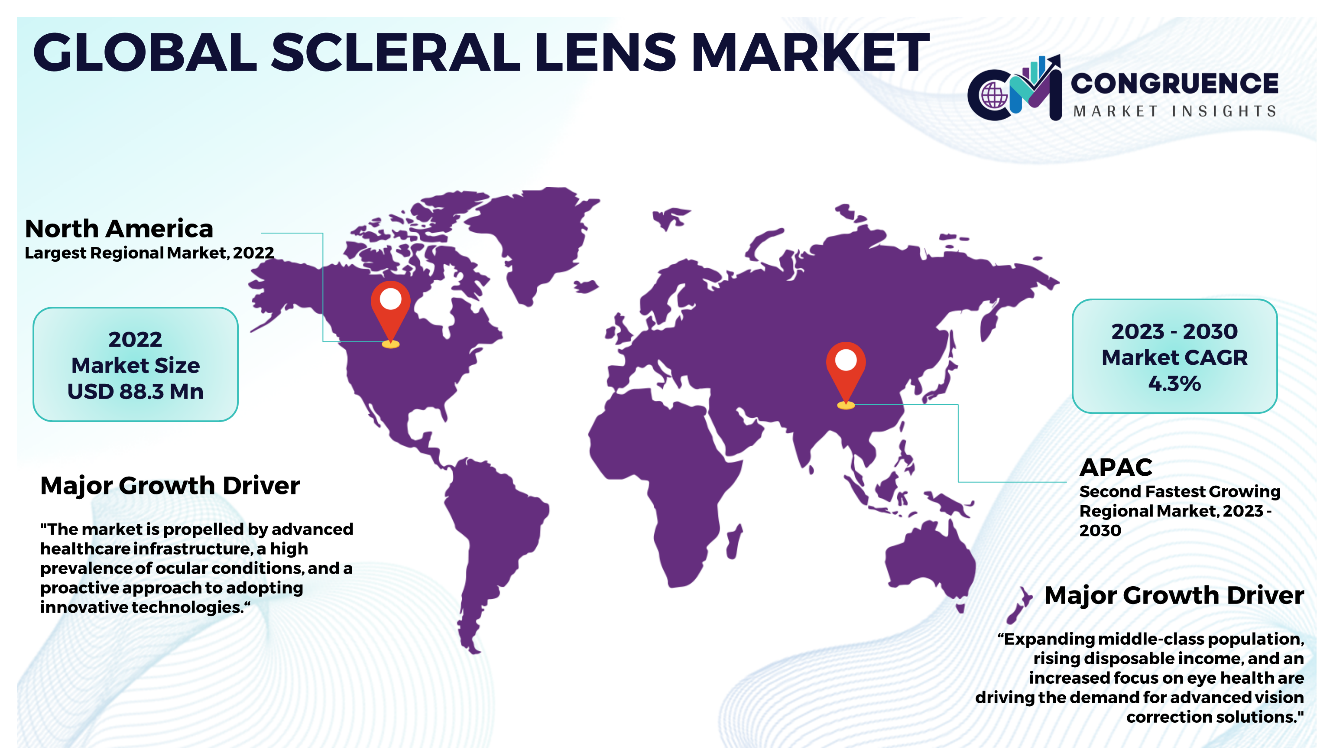Reports
The Global Scleral Lens Market was valued at USD 264.92 Million in 2022 and is anticipated to reach a value of USD 366.74 Million by 2030 expanding at a CAGR of 4.2% between 2023 and 2030.
The Scleral Lens market is a dynamic and rapidly expanding sector within the broader field of vision care. It is characterized by a diverse array of products and innovative solutions aimed at addressing the multifaceted needs of individuals with various ocular conditions. Scleral lenses, known for their distinctive design that covers the entire scleral surface, have garnered significant attention as a versatile option for patients confronting challenges such as keratoconus, irregular corneas, and severe dry eye syndrome. This market features a rich ecosystem that encompasses manufacturers, eye care practitioners, and researchers who are actively involved in refining materials, designs, and manufacturing processes. Noteworthy advancements in 3D printing technology and precision manufacturing have catalyzed the development of custom-fit scleral lenses, contributing to a more personalized and effective approach to vision correction. Moreover, the market reflects a growing awareness among both practitioners and patients regarding the benefits of scleral lenses, fostering increased adoption and propelling ongoing research and development initiatives. As the Scleral Lens market continues to evolve, it presents a promising landscape for innovation and collaboration, ultimately reshaping the paradigm of modern vision care.

Scleral Lens Market Major Driving Forces
Expansion of vision care industry: The growing prevalence of ocular conditions such as keratoconus, irregular corneas, and severe dry eye syndrome has generated a rising demand for specialized and advanced vision correction solutions, with scleral lenses emerging as a pivotal solution to address these complex needs.
Technological advancements: Technological advancements, particularly in 3D printing and precision manufacturing, have catalyzed a transformative shift in the customization and manufacturing processes of scleral lenses.
Increasing awareness: Increased awareness among both eye care practitioners and patients regarding the advantages of scleral lenses has significantly contributed to their heightened adoption. The lenses' ability to provide enhanced visual acuity, extended-wear comfort, and versatility in addressing diverse ocular conditions has fostered a positive perception and acceptance within the medical community and among individuals seeking effective vision correction.
Increasing focus on collaborations: Collaborations within the Scleral Lens market are thriving, with manufacturers, eye care practitioners, and researchers actively engaged in refining materials, designs, and manufacturing processes.
Scleral Lens Market Key Opportunities
Educational Initiatives and Marketing Campaigns: Educational programs and precisely targeted marketing strategies have the capacity to elevate awareness, fostering increased adoption and acceptance among potential users. This outreach initiative not only facilitates market expansion but also establishes a robust foundation for enduring sustainability.
Research and Development Activities: The combination of 3D printing and precision manufacturing opens avenues for research and development, encouraging the exploration of novel materials and design enhancements. Therefore, this has led to the development of next-generation scleral lens technologies that further elevate the standards of care in the industry.
Scleral Lens Market Key Trends
· The escalating integration of 3D printing technology in the production of scleral lenses. This technological advancement facilitates meticulous customization, allowing for the fabrication of lenses tailored to the distinctive contours of individual eyes.
· A growing focus on advanced materials within the realm of scleral lens development. Manufacturers are actively exploring and incorporating innovative materials to augment lens permeability, durability, and overall performance.
· Telemedicine is emerging as a prominent trend in the scleral lens market, particularly during the post-fitting and follow-up phases. By leveraging remote consultations and virtual monitoring, eye care practitioners can efficiently assess the performance of scleral lenses and address any concerns.
· With the increasing acknowledgment of scleral lenses as a viable solution for various eye conditions, concerted efforts are underway to educate both practitioners and patients about the advantages and proper usage of scleral lenses.
Region-wise Market Insights
North America accounted for the largest market share at 33.3% in 2022 and is expected to register the fastest growth, expanding at a CAGR of 4.5% between 2023 and 2030.

The scleral lens market exhibits distinct dynamics globally, reflecting nuanced preferences, variations in healthcare infrastructure, and differing prevalence rates of ocular conditions. The North America scleral lens market, characterized by resilience, is propelled by advanced healthcare facilities, a high incidence of ocular conditions, and a proactive inclination toward the adoption of innovative technologies. Notably, a discernible trend towards personalized vision correction solutions enhances the prominence of scleral lenses in this region.
In Europe, the scleral lens market is growing consistently due to a well-established healthcare system and increasing awareness of sophisticated vision correction alternatives. Countries like Germany, the United Kingdom, and France are experiencing heightened demand for scleral lenses, driven by an aging population and conditions such as keratoconus. The Asia-Pacific region, including China, Japan, and India, is a crucial growth area for the scleral lens market. The expanding middle-class population, rising disposable income, and a heightened focus on eye health are driving demand for advanced vision correction solutions. This region sees an increase in collaborations between local manufacturers and international entities to meet the growing needs of the population. South America and the Middle East & Africa regions are witnessing a promising adoption of scleral lenses. Opportunities for market expansion are present in these regions due to improved healthcare infrastructure, increased awareness, and a rising prevalence of ocular conditions. Tapping into the potential of these regions requires strategic collaborations with local healthcare providers and targeted marketing efforts.
Segment-wise Market Analysis
· Corneoscleral lenses tend to be the largest segment in the Scleral Lens market. As these lenses have risen to prominence by offering enhanced comfort, particularly for individuals with irregular corneas like those affected by keratoconus.
· Specialty clinics and ophthalmology centers represented the largest market segment. The dominance of specialty clinics and ophthalmology centers as sales channels is driven by their ability to offer specialized care and a heightened level of expertise, fostering trust among patients seeking advanced vision correction solutions.
Market Competition Landscape
The competitive landscape of the global scleral lens market is marked by intense rivalry among numerous manufacturers. Major players in this market employ strategies to attain a competitive advantage, such as product innovation, distinctive design approaches, and the integration of sustainable and eco-friendly materials to align with changing consumer preferences. Established brands leverage their recognized reputation for quality and reliability to sustain market share, while emerging entrants concentrate on disruptive innovations and distinctive selling propositions.
Key players in the global scleral lens market implement various organic and inorganic strategies to strengthen and improve their market positioning. Prominent players in the market include:
· Alcon Inc.
· Bausch + Lomb
· CooperVision Specialty Eyecare
· Menicon Co., Ltd.
· Euclid Vision Group
· Essilor
· Gelflex
|
Report Attribute/Metric |
Details |
|
Market Revenue in 2022 |
USD 274.19 Million |
|
Market Revenue in 2030 |
USD 366.74 Million |
|
CAGR (2023 – 2030) |
4.2% |
|
Base Year |
2022 |
|
Forecast Period |
2023 – 2030 |
|
Historical Data |
2018 to 2022 |
|
Forecast Unit |
Value (US$ Mn) |
|
Key Report Deliverable |
Revenue Forecast, Growth Trends, Market Dynamics, Segmental Overview, Regional and Country-wise Analysis, Competition Landscape |
|
Segments Covered |
· By Type (Corneo-Scleral, Semi-Scleral, Mini Scleral) · By Indication (Post-Surgical Complications, Myopia, Keratoconus, Cosmetic Purposes, Others) · By Sales Channel (Specialty Clinics/ Ophthalmology Clinics, Optical Retailers, Online Stores, Others) |
|
Geographies Covered |
North America: U.S., Canada and Mexico Europe: Germany, France, U.K., Italy, Spain, and Rest of Europe Asia Pacific: China, India, Japan, South Korea, Southeast Asia, and Rest of Asia Pacific South America: Brazil, Argentina, and Rest of Latin America Middle East & Africa: GCC Countries, South Africa, and Rest of Middle East & Africa |
|
Key Players Analyzed |
Alcon Inc., Bausch + Lomb, CooperVision Specialty Eyecare, Menicon Co., Ltd., Euclid Vision Group, Essilor, Gelflex |
|
Customization & Pricing |
Available on Request (10% Customization is Free) |
